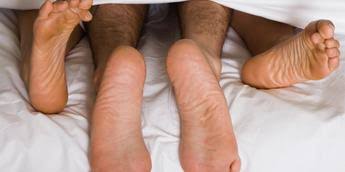The phenomenon of individuals getting stuck during sexual intercourse has become increasingly common in Kenya, with reports surfacing so frequently that it’s hard to go an entire month without hearing of such an occurrence. Unfortunately, this issue is often shrouded in myths and superstitions, with many people attributing it to witchcraft. As a result, individuals involved in such incidents are frequently taken to self-proclaimed witch doctors, who claim to be able to break the supposed "spell." These witch doctors often exploit people at their most vulnerable, when in fact, this is a medical condition that can be addressed by healthcare professionals.
In medical terms, getting stuck during intercourse is known as penis captivus, particularly in heterosexual couples. This condition arises when the vaginal muscles, specifically the pubococcygeus muscles, contract involuntarily and intensely during intercourse, temporarily trapping the penis. It is crucial to understand that this is not a supernatural phenomenon, but a rare medical issue that can be managed.
Penis captivus occurs when the vaginal muscles spasm during intercourse, often as part of the female orgasm. In rare cases, these muscles contract so tightly that the penis becomes trapped, making withdrawal difficult. Several factors can contribute to this, including strong vaginal contractions during orgasm, which can cause the vaginal muscles to tighten more than usual. Anxiety or psychological stress can also play a role, as emotional distress during intercourse may heighten muscle tension. Involuntary muscle spasms, possibly due to muscle fatigue or certain medical conditions, can further exacerbate the situation.
Despite being documented in medical literature, penis captivus is exceptionally rare. Most healthcare professionals may never encounter a case in their careers. Typically, the condition resolves on its own as the vaginal muscles relax, and there is no need for panic. Remaining calm, practicing deep breathing, and utilizing relaxation techniques are usually sufficient to manage the situation. In very rare instances, medical intervention may be required, but these cases are few and far between.
Interestingly, difficulties during intercourse are not confined to heterosexual couples. While penis captivus cannot occur in male same-sex encounters due to the absence of a vagina, similar challenges may arise during anal intercourse. The anus contains muscular rings, known as sphincters, which can spasm under certain conditions. These spasms may cause temporary tightness or discomfort, making it difficult for the penetrating partner to withdraw, creating a sensation somewhat similar to penis captivus. Anal sphincter spasms, though rare, can be triggered by emotional or physical stress, much like vaginal contractions. Certain medical conditions, such as proctalgia fugax—a disorder characterized by brief, intense rectal pain due to muscle spasms—can also contribute to difficulties during anal intercourse.
One might question the more frequent occurrence of this phenomenon in Africa compared to European countries. This may be attributed to the fact that people of African origin tend to have larger penises than others. According to the Daily Mail, a recent study compared the average erect penis size across various countries worldwide and revealed that African countries have the largest average penis sizes. Ultimately, people need to recognize that getting stuck during sex is a medical issue, not a product of witchcraft or curses. Instead of turning to fraudulent witch doctors, individuals should seek proper medical advice if the situation does not resolve naturally.
Most couples will never experience penis captivus, but if you do, remain calm and don’t try to pry yourself apart from your partner, as this could cause harm and worsen the situation. While it may feel uncomfortable, stop the action and wait; most couples can separate after a few seconds, or at worst, a few minutes. These incidents are generally manageable without medical intervention and understanding the physiological basis can help dispel harmful myths and superstitions.
